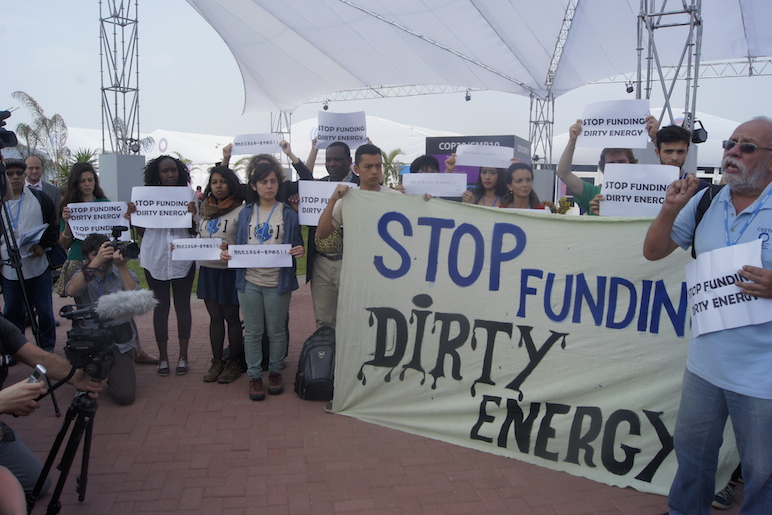
By Kofi Adu Domfeh
The global movement of campaigners for clean energy is growing at a fast pace. The aim is to increase the pressure on institutions to divest from the top 200 fossil fuel companies that are at the source of the climate crisis.
On February 13-14, 2015, the fossil fuel divestment movement came together for the Global Divestment Day of action to further de-legitimize the fossil fuel industry.
From South Africa to Australia, campaigners gathered to raise awareness at universities, cities, banks and religious institutions about the threat of a carbon bubble.
A commitment to decarbonize economies and transition to a 100% clean energy future by 2050 was also a vociferous subject at the climate change talks in Lima, Peru.
The decarbonization target is currently in the draft text of the climate agreement – close to 90 countries have voiced their support for the inclusion of a zero-emission target.
But there are fears fossil fuel companies and polluting countries will lobby furiously to get it removed before a deal is signed in Paris.
In Lima, a network of NGOs in Africa staged a campaign against funding for dirty energy, which involves the exploitation of the earth’s resources, especially petroleum, at the expense of the health and economic livelihoods of low-income communities.
They were loud in their words: “Stop Funding Dirty Energy”; as they cautioned countries like Ghana whose economy depends on the extractives industry.
The campaigners believe burning any fossil fuel for economic expansion is bad for the climate. They therefore want a stop to fossil fuel use by 2050 and attention turned to renewable, efficient energy use.
The African Group of Negotiators (AGN) proposed the Global Renewable Energy Partnership, in line with the UN Secretary-General’s sustainable energy for all initiative, launched in 2011.
Ghana’s oil industry is relatively young but country is hoping to rake in huge foreign exchange from the sector to fund its infrastructural development projects.
However, US-based Ghanaian researcher in sustainable biofuels, Prof. Akwasi Boateng, says the future concern of the country should no longer be about energy security but climate change.
According to him, an efficient policy framework and adequate State funding would induce research into alternative fuels that are sustainable and environmentally friendly for the Ghanaian economy.
“It’s no more energy security; it’s about the climate change,” said Prof. Boateng. “So if you use the fossil fuel, you have a depletable resource; it’s not renewable, you emit carbon dioxide which is not replaceable, so it’s not useful”.
Prof. Boateng is promoting the production of energy from carbon-neutral renewable energy resources, especially biomass, which involves the use of plant materials, including wood and grass.
Activists are increasingly calling on their institutions to not only divest from the fossil fuel industry, but reinvest their money in just and sustainable energy solutions, with a particular focus on initiatives that support communities most impacted by climate change and the dirty energy based economy.
Through divestment, activists in the Global South are also looking to challenge existing development policies tied to continued exploitation of fossil fuels at the expense of protecting people and planet.
“The existing high carbon development model largely benefits powerful industries and the wealthier segments of society while poor and vulnerable communities continue to carry the brunt of climate impacts” said Yossi Cadan, Global Divestment Senior Campaigner for 350.org. “We know climate change is the biggest global threat of the 21st century leading health organisations to join the call for divestment.”
The Centre for Renewable Energy and Energy Efficiency at the Kumasi Polytechnic is building local human resource capacity to harness the country’s renewable energy potentials.
“Harnessing this type of energy will lead to job creation, energy security, cleaner environment and sustainable development”, stated Rector of the Polytechnic, Prof. Nicholas Nsowah Nuamah.

Fossil fuel is a finite resource, which once exploited it takes hundreds of years for new formation to take place.
“The effects of a warming planet of which all of us bear witness to; flooding, rising sea levels, melting glaciers, have been largely attributed to the over exploitation of fossil fuel,” he said.
A Technical University of Kumasi to be sited at Kuntenase in 2016 will be self-sufficient in energy using renewable energy.
The Global Divestment Day builds on the momentum from last September’s People’s Climate March, which brought together over 400,000 people in the streets of New York City and hundreds of thousands more around the world.
Organizers see divestment as a key strategy in the lead up to the UN Climate Talks in Paris, as well.













Comments 1